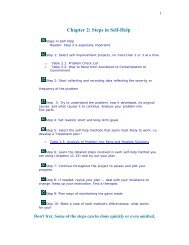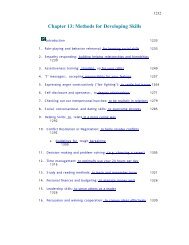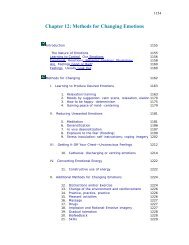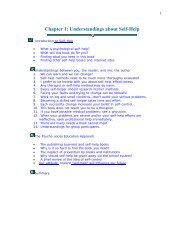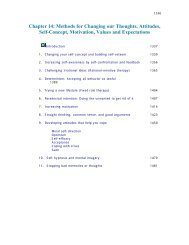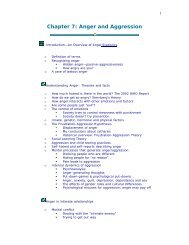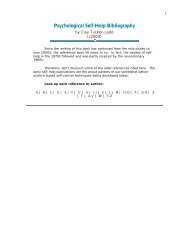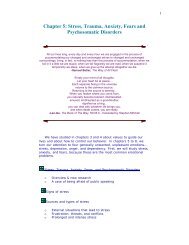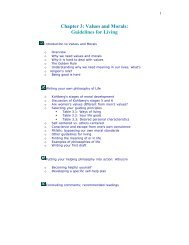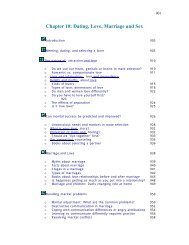Methods for Changing Behaviors - Psychological Self-Help
Methods for Changing Behaviors - Psychological Self-Help
Methods for Changing Behaviors - Psychological Self-Help
You also want an ePaper? Increase the reach of your titles
YUMPU automatically turns print PDFs into web optimized ePapers that Google loves.
· To reduce the tendency to behave in a certain way, usually an<br />
unwanted habit or emotion or thought.<br />
When the unwanted response is so dominant or strong that the<br />
desired behavior doesn't have a chance, you may need to punish and<br />
thereby weaken the unwanted response so the desired behavior can<br />
develop.<br />
Steps<br />
STEP ONE: Identify unwanted behavior.<br />
Specify exactly the behavior--what, when and where--that you<br />
would like to reduce in frequency or eliminate. Example: suppose you<br />
are a loner, but want to be more socially outgoing and involved with<br />
others. You might identify several target behaviors: (1) stop finding it<br />
more com<strong>for</strong>table to stay at home than to socialize a couple of times<br />
per week, (2) stop eating lunch alone in the office, eat with a friend<br />
twice a week, (3) stop merely speaking to people, have meaningful<br />
conversations, and (4) stop taking coffee breaks alone.<br />
Remember the unwanted "behavior" can be a thought or attitude<br />
or perhaps a feeling too, like a depressed thought or a jealous feeling.<br />
Note: Be<strong>for</strong>e using punishment, it is worthwhile to study carefully the situation the<br />
unwanted behavior occurs in and the rein<strong>for</strong>cement the unwanted behavior seems to be<br />
receiving. If you can stop the behavior by modifying the environment or stopping the<br />
rein<strong>for</strong>cement, that is probably a better approach than self-punishment.<br />
STEP TWO: Devise an appropriate punishment.<br />
There are several ways, consider these examples:<br />
1. Physical discom<strong>for</strong>t--flipping yourself on the wrist with a rubber<br />
band, smoking in a closed space, biting your tongue, doing<br />
extra exercise, going hungry, having to do a hard, dirty job,<br />
etc.<br />
2. Taking away something pleasant--no dessert, not getting to go<br />
to a show or shopping, no TV, can't see friends, giving up<br />
valuable possessions, etc. Behaviorists call this "time out" if it is<br />
only a temporary loss.<br />
3. Rules, fines, and penalties--"you can't have coffee unless you<br />
are talking with a friend," "if you don't exercise, you can't<br />
watch your favorite soap at noon," etc. Behaviorists call this<br />
"response cost." They also refer to "consequences" (an<br />
unpleasant task is required if unwanted behavior occurs),<br />
1142



